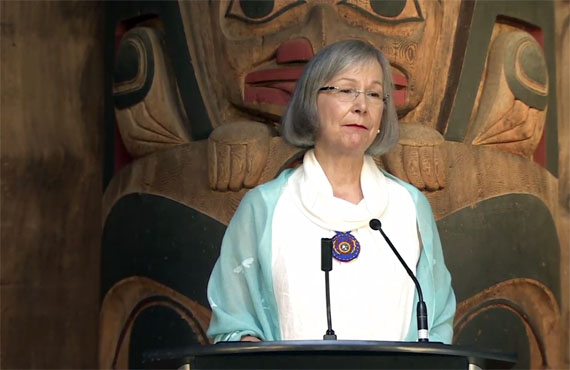Canadian inquiry on missing and murdered indigenous women to hold Nunavut hearing
The National Inquiry into Missing and Murdered Indigenous Women and Girls has announced its first set of community hearings for the fall, including a stop in Nunavut.
Rankin Inlet will be the inquiry’s final hearing in a nine-community tour starting in September.
Commissioners will visit Thunder Bay, Ont., Smithers, B.C., Maliotenam, Que., Winnipeg, Man., Edmonton, Alta., Saskatoon, Sask., Halifax, N.S., and Yellowknife, with its last hearing in Rankin Inlet set for the week of Dec. 4.

“It was absolutely a priority,” to ensure the inquiry visited an Inuit community in its first set of hearings, said commissioner Qajaq Robinson, an Ottawa-based lawyer who was raised in Igloolik.
“We had also received an invite [to come to Rankin Inlet] and we’ve stated previously that we didn’t want to go where we weren’t welcomed,” she said.
A community member in Rankin Inlet, Laura MacKenzie, initiated the invite with the support of the local hamlet and Qulliit Nunavut Status of Women.
Robinson said the inquiry will cater to each community it visits, mindful of its culture and language—and Rankin Inlet will be no exception.
“It’s important for us to be flexible and resourceful in a way that reflects the culture,” she said. “In that respect, [the hearing in] Rankin Inlet will be unique. It will be developed in partnership with the community.”
Robinson said the Kivalliq Inuit Association will serve as the community contact body as the inquiry prepares its visit.
The inquiry’s Inuit staff, including community liaison worker Looee Okalik and legal counsel Lillian Lundrigan (Aglukark), will visit the Kivalliq community in mid-August to make initial contact with families and survivors.
“We can’t do this work unless people come forward and share with us,” Robinson said, encouraging Nunavummiut to take part. “It will play a role in where we go.”
There are a number of ways Nunavummiut can contact the inquiry to register for the upcoming inquiry:
• By phone, toll free at 1-844-348-4119
• By fax at 604-775-5009
• By mail at PO Box 500, Station A – Vancouver BC V6C 2N3
• By mail at pr*****@mm*********.ca
• In-person during a community visit ahead of the hearing date
The commission also has an Inuktitut-language web page with more information.
Participation in the December hearing isn’t limited to residents of Rankin Inlet, Robinson said; any Nunavummiut can request to take part.
“Anyone who wants to take part should register and we can determine if that’s the best time for them to share,” Robinson said, noting the inquiry will visit other communities eventually.
“It’s a choice—we want to ensure that families and survivors are in a safe place.”
Spring 2018 community hearings will be announced this fall, Robinson said, although she couldn’t say if there would be other hearings in Nunavut.
Registered participants will have their travel costs covered by the inquiry, she noted.
Pauktuutit Inuit Women of Canada, which recently gained standing to take part in the inquiry on behalf of Inuit women, has suggested the commission visit eight different Inuit communities in additional to hosting Inuit-specific sessions in six different southern cities.
The organization has also asked for an Inuit-specific communication strategy, one that focuses on radio and even mail for Nunavummiut who don’t have access to the Internet.
Robinson said the inquiry’s Inuit team is currently working on an outreach strategy for its Nunavut hearing.
During a July 6 press conference, the inquiry’s chief commissioner Marion Buller responded to questions about more staff resignations—the inquiry’s executive director Michele Moreau among them—along with concerns about the commission’s ability to complete its work within its two-year timeframe.
Buller assured reporters that the inquiry is making good progress.
Despite delays getting started, Buller said commissioners will be able to meet their November deadline to produce the inquiry’s interim report.
But the chief commissioner did express concerns about meeting the inquiry’s mandate in the allotted time; the inquiry is set to wrap up in September 2018, two years after it was initially launched.
“We can’t do the type of work we want to do in the timeframe the government has given us,” Buller told reporters July 6. “But we haven’t done the formal request [for an extension] yet.”
Over the summer months, the inquiry also plans to host two expert panels: one on Indigenous law and decolonization in Winnipeg and another on human rights, to be held in Montreal.
A national, toll-free crisis line is available to support families and survivors of violence, 24 hours a day, at 1-844-413-6649.